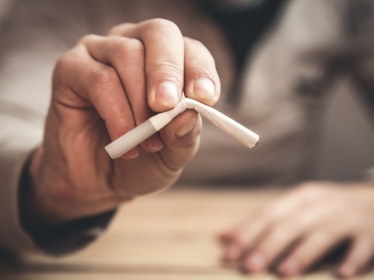What causes nosebleeds?
The inside of the nose has a lot of blood vessels that are close to the surface, so it's easy for them to get irritated or injured. Most nosebleeds are caused by nothing more than the irritation from dry or cold air, or by injury caused by nose-picking or trauma (e.g. a fall or bike accident).
They can also be more common during a period of cold, especially in children with allergic/sensitive nose. Blowing the nose too hard or too often can also result in nosebleed. A foreign body in the nose may either put pressure on the blood vessels or irritate the nose to cause it to bleed. An underlying medical condition (e.g. bleeding disorders) that causes easy bruising may cause nose bleeds but is very uncommon.
Why is it more common in children?
Nose bleeding is actually quite common in children but is rarely severe and seldom needs hospitalization. Children’s nasal lining are much thinner and the blood vessels are very close to the surface of the mucosal lining of the nasal septum, making them more likely to rupture and bleed when rubbed. This usually improves when they reach puberty.
How to treat children when they are experiencing nosebleeds? How do you stop a nosebleed in a child?
Nosebleed can be scary for both the child and parent but with the right care, most of them stop quite easily and quickly.
Here's what you can do!
- Calm and comfort your child
- Sit your child upright in a comfortable position, and lean slightly forward.
- Using the thumb and index finger, pinch the soft part of the nose together, below the bone (your child can do this if they are older). Keep squeezing for 5 minutes. Ask your child to open and breathe through his mouth during this time.
- Do not keep removing your fingers to check if the bleeding has stopped. The blood needs to clot and this takes time. Reading a book can be a good distraction for your child.
- After 5 minutes, release the nose gently and check if the bleeding has stopped. If the nosebleed continues, squeeze the nostrils for another 5 minutes.
- Encourage your child to spit out any blood that has dripped from their nose into their mouth. Swallowing blood may make your child vomit, which can cause the nosebleed to continue or worsen.
- Once the bleeding has stopped, avoid picking at the nose or blowing out the blood clots for the next 2-3 days to allow the wound to heal. Doing so may cause the bleeding to recur.
What should we not do to children when they are having nosebleeds?
- Ask him to blow his nose or remove any blood clot from the nose. This may disrupt the clotting process and re-start the nose bleed
- Tilt the head backwards or lie down on his back. This may lead to the blood flowing backwards to the lungs, causing aspiration or swallowed blood that leads to irritation of the stomach, resulting in gastritis and vomiting of the swallowed blood. This can be quite frightening to the child and the parents
- Applying a cold washcloth to the forehead, back of the neck, bridge of the nose or under the upper lip or pressing on the bony part of the nose as these manoeuvres do nothelp to stop a nosebleed.
- Packing your child’s nose with tissue or handkerchief as the bleeding is likely to recur when it is removed (removal disrupts the clot)
How can we prevent nosebleeds in children?
- Humidify the air especially when in an air-conditioned room or at night
- Prevent local trauma to the nose by discouraging the child from picking his nose and keeping his finger nails trimmed.
- Apply a nasogel or petroleum jelly to the septum (diving wall) of the nostrils 2-3 times a day to keep it moist and reduce the chance of re-bleeding
- Use of saline nasal spray in the correct way (pointing away from the nasal septum towards the eye on the same side)
- Treating any sensitive nose (allergic rhinitis) using an antihistamine by reducing itch and inflammation of the nose.
Is recurring nosebleed a serious problem? Should I be concerned about my child’s nosebleeds?
Recurrent nosebleeds in children are quite common and can be caused by:
- Breathing dry air often
- Using cold or allergy nasal sprays too much
- Frequent colds
- Poorly controlled allergic rhinitis (sensitive nose) with frequent rubbing of nose
In some cases, repeat nosebleeds can be a sign that your child’s blood does not clot like it should. If that is the case, there are often other clues e.g. easy bruising (gum bleeding, bruising after a minor knock or taking a long time for a cut or scrape to stop bleeding).
You should seek medical attention at the clinic or at the Children’s Emergency immediately if your child’s nosebleed:
- Causes blood to gush out of his nose or makes it hard to breathe
- Causes him to turn very pale or weak
- Will not stop even after you do the "self-care" steps mentioned
- Happens right after surgery on his nose,
- Happens with other serious symptoms e.g. bruises, pallor, gum bleeding
- Happens after a serious injury, like a car accident or a hard hit in the face
- Is due to a foreign body lodged in the nose
The doctor will exclude other underlying serious medical conditions, after which he may decide to cauterize (applying a chemical substance to burn) the blood vessels in the nose. You may book an appointment with Dr Wong at SBCC Baby & Child Clinic (Tiong Bahru) or visit any of our Baby Bonus Approved clinics.





